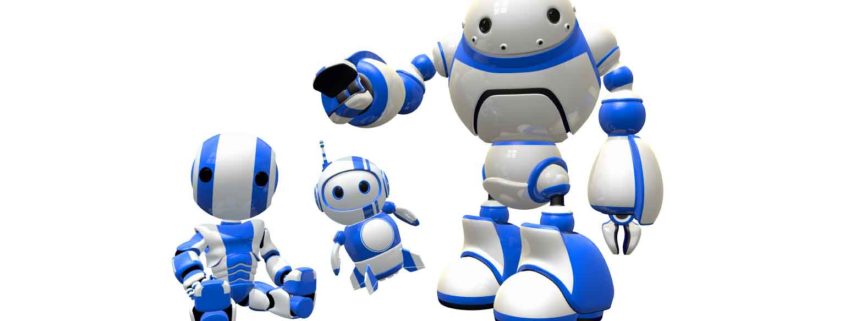The Evolution of AI: Can Morality be Programmed?
Click here to see this page in other languages: Chinese ![]()
The following article was originally posted on Futurism.com.
Recent advances in artificial intelligence have made it clear that our computers need to have a moral code. Disagree? Consider this: A car is driving down the road when a child on a bicycle suddenly swerves in front of it. Does the car swerve into an oncoming lane, hitting another car that is already there? Does the car swerve off the road and hit a tree? Does it continue forward and hit the child?
Each solution comes with a problem: It could result in death.
It’s an unfortunate scenario, but humans face such scenarios every day, and if an autonomous car is the one in control, it needs to be able to make this choice. And that means that we need to figure out how to program morality into our computers.
Vincent Conitzer, a Professor of Computer Science at Duke University, recently received a grant from the Future of Life Institute in order to try and figure out just how we can make an advanced AI that is able to make moral judgments…and act on them.
MAKING MORALITY
At first glance, the goal seems simple enough—make an AI that behaves in a way that is ethically responsible; however, it’s far more complicated than it initially seems, as there are an amazing amount of factors that come into play. As Conitzer’s project outlines, “moral judgments are affected by rights (such as privacy), roles (such as in families), past actions (such as promises), motives and intentions, and other morally relevant features. These diverse factors have not yet been built into AI systems.”
That’s what we’re trying to do now.
In a recent interview with Futurism, Conitzer clarified that, while the public may be concerned about ensuring that rogue AI don’t decide to wipe-out humanity, such a thing really isn’t a viable threat at the present time (and it won’t be for a long, long time). As a result, his team isn’t concerned with preventing a global-robotic-apocalypse by making selfless AI that adore humanity. Rather, on a much more basic level, they are focused on ensuring that our artificial intelligence systems are able to make the hard, moral choices that humans make on a daily basis.
So, how do you make an AI that is able to make a difficult moral decision?
Conitzer explains that, to reach their goal, the team is following a two path process: Having people make ethical choices in order to find patterns and then figuring out how that can be translated into an artificial intelligence. He clarifies, “what we’re working on right now is actually having people make ethical decisions, or state what decision they would make in a given situation, and then we use machine learning to try to identify what the general pattern is and determine the extent that we could reproduce those kind of decisions.”
In short, the team is trying to find the patterns in our moral choices and translate this pattern into AI systems. Conitzer notes that, on a basic level, it’s all about making predictions regarding what a human would do in a given situation, “if we can become very good at predicting what kind of decisions people make in these kind of ethical circumstances, well then, we could make those decisions ourselves in the form of the computer program.”
However, one major problem with this is, of course, that morality is not objective — it’s neither timeless nor universal.
Conitzer articulates the problem by looking to previous decades, “if we did the same ethical tests a hundred years ago, the decisions that we would get from people would be much more racist, sexist, and all kinds of other things that we wouldn’t see as ‘good’ now. Similarly, right now, maybe our moral development hasn’t come to its apex, and a hundred years from now people might feel that some of the things we do right now, like how we treat animals, is completely immoral. So there’s kind of a risk of bias and with getting stuck at whatever our current level of moral development is.”
And of course, there is the aforementioned problem regarding how complex morality is. “Pure altruism, that’s very easy to address in game theory, but maybe you feel like you owe me something based on previous actions. That’s missing from the game theory literature, and so that’s something that we’re also thinking about a lot—how can you make this, what game theory calls ‘Solutions Concept’—sensible? How can you compute these things?”
To solve these problems, and to help figure out exactly how morality functions and can (hopefully) be programmed into an AI, the team is combining the methods from computer science, philosophy, and psychology “That’s, in a nutshell, what our project is about,” Conitzer asserts.
But what about those sentient AI? When will we need to start worrying about them and discussing how they should be regulated?
THE HUMAN-LIKE AI
According to Conitzer, human-like artificial intelligence won’t be around for some time yet (so yay! No Terminator-styled apocalypse…at least for the next few years).
“Recently, there have been a number of steps towards such a system, and I think there have been a lot of surprising advances….but I think having something like a ‘true AI,’ one that’s really as flexible, able to abstract, and do all these things that humans do so easily, I think we’re still quite far away from that,” Conitzer asserts.
True, we can program systems to do a lot of things that humans do well, but there are some things that are exceedingly complex and hard to translate into a pattern that computers can recognize and learn from (which is ultimately the basis of all AI).
“What came out of early AI research, the first couple decades of AI research, was the fact that certain things that we had thought of as being real benchmarks for intelligence, like being able to play chess well, were actually quite accessible to computers. It was not easy to write and create a chess-playing program, but it was doable.”
Indeed, today, we have computers that are able to beat the best players in the world in a host of games—Chess and Alpha Go, for example.
But Conitzer clarifies that, as it turns out, playing games isn’t exactly a good measure of human-like intelligence. Or at least, there is a lot more to the human mind. “Meanwhile, we learned that other problems that were very simple for people were actually quite hard for computers, or to program computers to do. For example, recognizing your grandmother in a crowd. You could do that quite easily, but it’s actually very difficult to program a computer to recognize things that well.”
Since the early days of AI research, we have made computers that are able to recognize and identify specific images. However, to sum the main point, it is remarkably difficult to program a system that is able to do all of the things that humans can do, which is why it will be some time before we have a ‘true AI.’
Yet, Conitzer asserts that now is the time to start considering what the rules we will use to govern such intelligences. “It may be quite a bit further out, but to computer scientists, that means maybe just on the order of decades, and it definitely makes sense to try to think about these things a little bit ahead.” And he notes that, even though we don’t have any human-like robots just yet, our intelligence systems are already making moral choices and could, potentially, save or end lives.
“Very often, many of these decisions that they make do impact people and we may need to make decisions that we will typically be considered to be a morally loaded decision. And a standard example is a self-driving car that has to decide to either go straight and crash into the car ahead of it or veer off and maybe hurt some pedestrian. How do you make those trade-offs? And that I think is something we can really make some progress on. This doesn’t require superintelligent AI, this can just be programs that make these kind of trade-offs in various ways.”
But of course, knowing what decision to make will first require knowing exactly how our morality operates (or at least having a fairly good idea). From there, we can begin to program it, and that’s what Conitzer and his team are hoping to do.
So welcome to the dawn of moral robots.
This interview has been edited for brevity and clarity.





Dear all
The extra complication is that we have an urgent and intense debate within philosophy about the role of ethics anyway. Fist of all we have at least four fundamental different approaches of ethics, then we several meta ethical frames. Contizer seems to follow the descriptive approach and the functional utilitarian way of doing morals. If we just observe and describe nowadays moral behavior we might prolongate a worst practice. We see a increase naive belief in simple facts and a distrust in collective mental values. While logical positivism has been buried for more then 50 years, yet it has its glory days now in folk psychology. From some other perspective, cultural values are collective mental entities that form the essence of humanity. Ethics is not something separated in a corner of society, it is our human world. A second flaw could be that we live in a dominance of Utilitarian approaches, this dominance combined with big date could imply the loss of he quality of human lives, while Utilitarian approaches are quantitative. As professor Wiggens is warning us of the devastating effects of power of this approach, we should incorporate these reflections into our design of any AI. The debate about the foundation of our morals can give perspective on the debate of big data and AI. Do not just copy a bad situation as factual truth.
Yes, indeed, what are the foundations of ethics? Assuming that Schopenhauer is right in claiming that compassion should be the basis of ethics, how can we ‘teach’ robots to show compassion? We are talking not about a set of rules that could be taught, but about an ‘attitude’ that would lead to very different actions depending on the circumstances. Human compassion is only possible because we are capable of showing emotions. Can AI’s, even in principle, have emotions?
See
https://krohde.wordpress.com/2016/05/27/artificial-intelligence-and-dangerous-robots-barking-up-the-wrong-tree/
and
https://krohde.wordpress.com/2010/03/31/arthur-schopenhauer-ethics-and-theory-xk923bc3gp4-106/
if emoto’s water crystals really shape-shift on morality effect of words and material near them, then we just need a pattern analyzer to
rate beauty and harmony of crystals which have impacted by studied words or action.
hihi
apologies if I seem foolish
I think the notion of programming morality as we humans understand it into AI it to be a mistake on our part by way of Anthropomorphism a cognitive bias and personification. I feel like this error goes unnoticed as this is not something I imagine most traditionally schooled computer scientists might be wary of , I might be mistaken though. 🙂